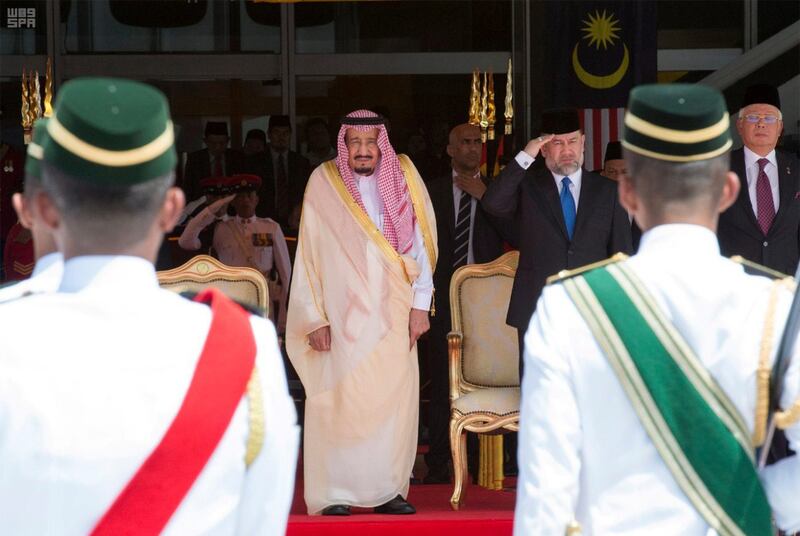Abu Dhabi // Saudi King Salman began a rare month-long tour of Asia in Malaysia on Sunday in a trip aimed primarily at enhancing trade ties with the world’s fastest-growing economic region as the kingdom seeks investment to fuel its diversification plans.
The 81-year-old monarch was received by Malaysian prime minister Najib Razak at the Kuala Lumpur airport before a state ceremony at parliament and a meeting with its king, Yang di-Pertuan Agong Sultan Muhammad V. Mr Najib and King Salman are scheduled to hold talks on Monday.
The last Saudi ruler to visit Malaysia was King Abdullah in 2006. Since then, economic and security ties between the two countries have grown.
"Trade and investment remain the major cornerstone of discussions between both countries," Malaysian foreign minister Anifa Aman told the New Straits Times.
Riyadh is hoping to attract investors from the region through its Vision 2030 economic diversification strategy, a cornerstone of which is a public offering for up to 5 per cent of the country's most important asset, Saudi Aramco oil company.
“Certainly, the Aramco IPO will be part of these talks given Malaysia’s expertise in oil [and] gas and Islamic banking,” said Sean Foley, a professor at Middle Tennessee State University who studies historical and political ties between the Gulf and South-east Asia.
The sale has been scheduled for next year, though there have been reports of possible delays. Saudi officials are also considering whether to host the listing, or part of it, on an Asian exchange. The kingdom is also seeking investors and skilled workers for its plans to expand its industrial base.
“Malaysia will capitalise on the National Transformation Plan and Vision 2030 of the Saudi government, which are aimed at diversifying economic activities,” Mr Aman said. “In this regard, Malaysia hopes to export not just goods, but also expertise and know-how in manufacturing and services to Saudi Arabia.”
Economic cooperation under discussion during the trip will not be limited to ventures in Saudi Arabia. Local media reported that the Malaysian state oil company Petronas and Aramco will sign an agreement to work on a major refining and petrochemical project in Malaysia.
“Saudi Arabian investment in Malaysia is expected to create thousands of jobs and we are proud that Malaysian firms have been chosen to undertake projects at some of the most prestigious locations in Saudi Arabia,” Mr Najib said.
The kingdom is Malaysia’s second-largest trade partner in the Middle East and trade increased by more than 12 per cent to US$3.17 billion (Dh11.64bn) between 2015 and 2016, Mr Aman said.
“Political and economic relations have grown especially close over the last twenty years, with the growth of Malaysia and other Asian economies and Saudi Arabia’s look-east foreign policy after 2005,” Mr Foley said. “Today, scores of Malaysians work in the kingdom, which is one of Malaysia’s fastest growing trading partners.”
A record number of more than 100,000 Saudi citizens visited Malaysia in 2016, he added.
South-east Asia faces a serious threat from local supporters of ISIL and other extremist groups, and the two countries have also become more closely aligned on security and counter-terrorism in recent years.
Kuala Lumpur joined the Saudi-led Islamic Military Alliance that is ostensibly aimed at counterterrorism, although Malaysian officials said their role was limited to intelligence cooperation. The country's defence minister held talks in Riyadh with Deputy Crown Prince Mohammed bin Salman in November, and the two countries announced they were establishing a joint centre aimed at countering extremist narratives online. Last year, both countries signed an agreement to strengthen defence cooperation.
There has been some tension in relations in the past year over a money-laundering scandal at 1MDB, the Malaysian sovereign wealth investment fund founded by Mr Najib.
An investigation by Malaysian authorities found that in 2013, $700 million was transferred by the Saudi royal family into Mr Najib’s personal bank account. Mr Najib has denied wrongdoing, and the investigation found that most of the amount was returned, although other countries including the US are still investigating.
After Malaysia, King Salman will travel to Indonesia, Brunei, Japan, China and the Maldives before making a stop in Jordan on his way home.
He will “meet the leaders of those countries to discuss bilateral relations and regional and international issues of common concern”, the Saudi royal court said.
tkhan@thenational.ae





